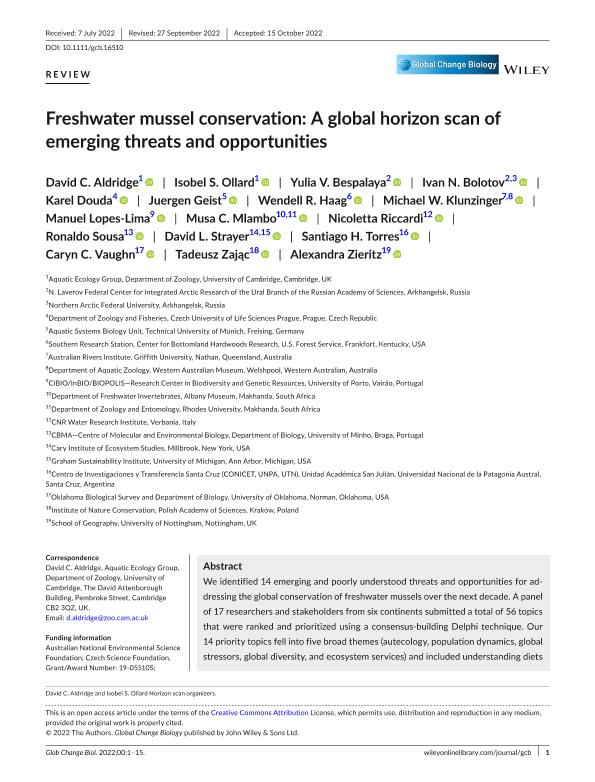Mostrar el registro sencillo del ítem
dc.contributor.author
Aldridge, David C.
dc.contributor.author
Ollard, Isobel S.
dc.contributor.author
Bespalaya, Yulia V.
dc.contributor.author
Bolotov, Ivan N.
dc.contributor.author
Douda, Karel

dc.contributor.author
Geist, Juergen
dc.contributor.author
Haag, Wendell R.
dc.contributor.author
Klunzinger, Michael W.

dc.contributor.author
Lopes Lima, Manuel
dc.contributor.author
Mlambo, Musa C.
dc.contributor.author
Riccardi, Nicoletta
dc.contributor.author
Sousa, Ronaldo
dc.contributor.author
Strayer, David L.
dc.contributor.author
Torres, Santiago Hernan

dc.contributor.author
Vaughn, Caryn C.
dc.contributor.author
Zajac, Tadeusz
dc.contributor.author
Zieritz, Alexandra
dc.date.available
2023-07-31T17:48:44Z
dc.date.issued
2022-11
dc.identifier.citation
Aldridge, David C.; Ollard, Isobel S.; Bespalaya, Yulia V.; Bolotov, Ivan N.; Douda, Karel; et al.; Freshwater mussel conservation: A global horizon scan of emerging threats and opportunities; Wiley Blackwell Publishing, Inc; Global Change Biology; 29; 3; 11-2022; 575-589
dc.identifier.issn
1354-1013
dc.identifier.uri
http://hdl.handle.net/11336/206207
dc.description.abstract
We identified 14 emerging and poorly understood threats and opportunities for addressing the global conservation of freshwater mussels over the next decade. A panel of 17 researchers and stakeholders from six continents submitted a total of 56 topics that were ranked and prioritized using a consensus-building Delphi technique. Our 14 priority topics fell into five broad themes (autecology, population dynamics, global stressors, global diversity, and ecosystem services) and included understanding diets throughout mussel life history; identifying the drivers of population declines; defining metrics for quantifying mussel health; assessing the role of predators, parasites, and disease; informed guidance on the risks and opportunities for captive breeding and translocations; the loss of mussel–fish co-evolutionary relationships; assessing the effects of increasing surface water changes; understanding the effects of sand and aggregate mining; understanding the effects of drug pollution and other emerging contaminants such as nanomaterials; appreciating the threats and opportunities arising from river restoration; conserving understudied hotspots by building local capacity through the principles of decolonization; identifying appropriate taxonomic units for conservation; improved quantification of the ecosystem services provided by mussels; and understanding how many mussels are enough to provide these services. Solutions for addressing the topics ranged from ecological studies to technological advances and socio-political engagement. Prioritization of our topics can help to drive a proactive approach to the conservation of this declining group which provides a multitude of important ecosystem services.
dc.format
application/pdf
dc.language.iso
eng
dc.publisher
Wiley Blackwell Publishing, Inc

dc.rights
info:eu-repo/semantics/openAccess
dc.rights.uri
https://creativecommons.org/licenses/by/2.5/ar/
dc.subject
CONSERVATION
dc.subject
DIVERSITY
dc.subject
ECOSYSTEM SERVICES
dc.subject
FRESHWATER MUSSEL
dc.subject
HORIZON SCAN
dc.subject
MUSSEL HEALTH
dc.subject
THREATS
dc.subject
UNIONID
dc.subject.classification
Conservación de la Biodiversidad

dc.subject.classification
Ciencias Biológicas

dc.subject.classification
CIENCIAS NATURALES Y EXACTAS

dc.title
Freshwater mussel conservation: A global horizon scan of emerging threats and opportunities
dc.type
info:eu-repo/semantics/article
dc.type
info:ar-repo/semantics/artículo
dc.type
info:eu-repo/semantics/publishedVersion
dc.date.updated
2023-07-28T17:30:15Z
dc.journal.volume
29
dc.journal.number
3
dc.journal.pagination
575-589
dc.journal.pais
Reino Unido

dc.journal.ciudad
Londres
dc.description.fil
Fil: Aldridge, David C.. University of Cambridge; Reino Unido
dc.description.fil
Fil: Ollard, Isobel S.. University of Cambridge; Reino Unido
dc.description.fil
Fil: Bespalaya, Yulia V.. Northern Arctic Federal University; Rusia
dc.description.fil
Fil: Bolotov, Ivan N.. Northern Arctic Federal University; Rusia
dc.description.fil
Fil: Douda, Karel. Czech Academy of Sciences; República Checa
dc.description.fil
Fil: Geist, Juergen. Technical University Of Munich; Alemania
dc.description.fil
Fil: Haag, Wendell R.. Center For Bottomland Hardwoods Research; Estados Unidos
dc.description.fil
Fil: Klunzinger, Michael W.. Griffith University; Australia
dc.description.fil
Fil: Lopes Lima, Manuel. Universidad de Porto; Portugal
dc.description.fil
Fil: Mlambo, Musa C.. Rhodes University; Sudáfrica
dc.description.fil
Fil: Riccardi, Nicoletta. No especifíca;
dc.description.fil
Fil: Sousa, Ronaldo. Universidade do Minho; Portugal
dc.description.fil
Fil: Strayer, David L.. University of Michigan; Estados Unidos
dc.description.fil
Fil: Torres, Santiago Hernan. Universidad Nacional de la Patagonia Austral. Unidad Académica San Julián; Argentina. Consejo Nacional de Investigaciones Científicas y Técnicas. Centro de Investigaciones y Transferencia de Santa Cruz. Universidad Tecnológica Nacional. Facultad Regional Santa Cruz. Centro de Investigaciones y Transferencia de Santa Cruz. Universidad Nacional de la Patagonia Austral. Centro de Investigaciones y Transferencia de Santa Cruz; Argentina
dc.description.fil
Fil: Vaughn, Caryn C.. Oklahoma State University; Estados Unidos
dc.description.fil
Fil: Zajac, Tadeusz. Polish Academy of Sciences; Argentina
dc.description.fil
Fil: Zieritz, Alexandra. University of Nottingham; Estados Unidos
dc.journal.title
Global Change Biology

dc.relation.alternativeid
info:eu-repo/semantics/altIdentifier/url/https://onlinelibrary.wiley.com/doi/10.1111/gcb.16510
dc.relation.alternativeid
info:eu-repo/semantics/altIdentifier/doi/http://dx.doi.org/10.1111/gcb.16510
Archivos asociados
